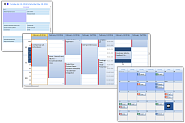| |
|
|
The
ctxCalendar control encapsulates arrays, methods,
events, and properties that allow the developer to bind the
control to virtually any data source containing
collaboration data, i.e. appointments, contacts, locations,
and tasks. At its heart, the ctxCalendar control presents
appointment information and provides a platform for a user
to visually interact with that information. The ctxCalendar
control manages 4 collections of appointment and appointment
support objects internally:

1. Appointments
2. Contacts
3. Locations
4. Tasks
NOTE: The control also has support for
Custom Areas.
The data/control relationship that governs the binding of
the ctxCalendar control to a database revolves around the
Add/Edit/Delete of appointments with or without a
relationship to a given Task, Location, and/or Contact. In
this scenario any action on the appointment is recorded in a
single record in the database.
Loading the control from a database
The ctxCalendar control objects are designed to represent
the tables in which theobjects are persisted as data.
Accordingly, the collections are loaded by reading in the
associated tables. Appointments represent the time period
assigned to a Task or Tasks and/or or to a resource or group
of resources such as a Location(s) and/or a Contact(s).
Before adding appointments to the control, the developer
should populate the Contacts, Tasks, and Locations (if
applicable) with the data being scheduled in the calendar.
In addition to the standard properties used to describe the
Appointment, Contact, Location, and Task entities there are
two key properties on each collection object in the control
used to bind the objects to the database; Cargo and Data.
The
ctxCalendar control defines a period of time over which
collaboration data is presented. The time period is defined
by a start and end date. As each record is processed from
the database the appropriate ctxCalendar method is used to
add the object to the control and its properties are set to
reflect the record in the database. When the control is
first instanced the start and end dates for the control are
set. These values then become the base parameters for
selecting existing appointment records from the database to
load in to the control.
To load the Appointments from the database the developer
selects all appointments that match the criteria set on the
ctxCalendar control (date range, Contacts, Locations, Tasks)
and programmatically loops through the records creating an
appointment using the AddAppointment method for each record.
Cargo Property
The Cargo property (of type string) can be used to capture
the value of the key field in the table representing the
entity. For example, the Appointment_Cargo field value
stores the key field (unique) value of the Appointment
Record in the Appointments Table.
Data Property
The Data property (of type Long Integer) can also be used to
capture the value of the key field in the table.
Writing changes back to the database
Changes to an appointment are surfaced through events raised
in the control at the time the user interacts with the
ctxCalendar control or an appointment in the control; for
example, creating, moving, or selecting to delete an
appointment. The key to reflecting these changes is to
create, or identify and modify the data related to the
appointment being created or changed. Any changes to the
appointment object fire events that allow the developer to
query the appointment for its Cargo or Data property value
which can then be used to persist the change back to the
database.
XML Data
The ctxCalendar control is capable of reading and writing
XML data. The data can be read and written as a string into
or from memory, or to and from a file. The control is also
capable of creating XML data for the entire control,
Appointments details only, or all the objects except the
appointments.
READ AND WRITE AN XML FILE
The methods used to read and write the xml files are the
ReadFile and WriteFile. A valid XML file can be read from a
local drive, a mapped drive, or from a web site. The
WriteFile method supports committing data to local drive or
a mapped drive. More on XML data support next time.
SUMMARY
Databinding the
ctxCalendar control requires three distinct points of
integration; loading the data from the database, responding
to changes (moves/edits) to the appointments in the calendar
object, and responding to Adds (new) and Deletes to the
appointments in the calendar object. Each of the objects in
the calendar (appointments, contacts, tasks, and locations)
has properties that allow the developer to persist the
relationship of the object in the database being reflected.
Each event that is fired in the calendar passes the
appointment against which the event occurred (move, size,
add) to allow the developer to read the necessary property
values (start time, end time, etc.) and its persistence
scheme (record id in Cargo or Data, to the object in the
database. |
|
|